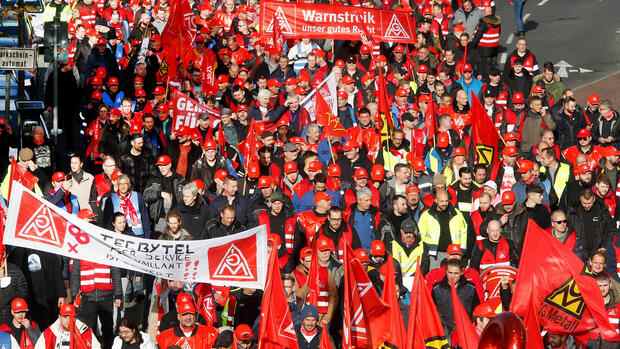Berlin An agreement has been reached in the collective bargaining dispute for the 3.9 million employees in the metal and electrical industry. Wage increases of 5.2 percent by June 2023 and another 3.3 percent from May 2024 over a period of 24 months are planned, as the IG Metall union and the Südwestmetall employers’ association announced early Friday morning in Ludwigsburg. In addition, there are tax-free one-off payments totaling 3,000 euros. The result is considered a pilot project, the core of which should also be implemented in other districts.
IG Metall district leader Roman Zitzelberger said after the twelve-hour negotiations: “We fought and negotiated hard, but in the end there is an acceptable compromise on the table. The colleagues are finally getting the permanent percentage increase in pay that they are entitled to.”
Südwestmetall negotiator Harald Marquardt spoke of what he saw as a “painful compromise” that was only acceptable because the long term gave companies planning security. In addition, an automatic differentiation for companies in need is included.
For example, companies can postpone, shorten or cancel the so-called additional tariff allowance (T-Zug), which was agreed in 2018 and is paid annually, in the next and the next but one. The prerequisite is that their net return on sales is less than 2.3 percent. However, the additional money increases from currently around 400 to 600 euros.
Top jobs of the day
Find the best jobs now and
be notified by email.
Above all, employers could control the calendar year in which they want to pay out the inflation compensation premium of 3,000 euros, emphasized Marquardt. “In this way we create a very large leverage in the variability of costs and take into account the different economic conditions.”
IG Metall went into the negotiations, which began at the regional level in September, with a demand for eight percent more money over a period of twelve months. She had made it clear in the previous rounds that a conclusion without a table increase, i.e. without a permanent percentage increase in wages and salaries, could not be made with her.
IG Metall referred to the high level of inflation, which had risen to its highest level since 1951 at 10.4 percent in October. According to trade unions, since the peace obligation expired on October 29, more than 774,000 workers have taken part in warning strikes to reinforce the demands. If the negotiations failed, the union had threatened an escalation of the industrial action through so-called 24-hour strikes or a ballot on forced strikes.
“In an extremely challenging time, it was possible to noticeably relieve the employees, to stabilize income in the long term and to strengthen purchasing power,” said IG Metall boss Jörg Hofmann in praise of the compromise. With the wage agreement, the metal and electrical industry is also supporting the economy in Germany.
In contrast, the employers had pointed out in the negotiations that Germany was heading for a recession in the coming year and that there was therefore little scope for distribution. In addition, the good results of corporations such as Siemens, which reported record operating profits on Thursday, should not hide the fact that the situation in the metal and electrical industry is very heterogeneous overall.
Many small and medium-sized companies in particular feared for their existence in view of the sharp rise in energy prices. In addition, given the economic uncertainty or delivery difficulties, many orders would be canceled. As if to confirm, the Federal Statistical Office reported on Thursday that the backlog of orders in German industry had fallen again for the first time since the beginning of the corona pandemic.
The employers had initially only promised an inflation premium of 3,000 euros and offered to talk about a permanent percentage increase if the union agreed to a long term of 30 months. They also called for automatic differentiation in the collective agreement, i.e. the possibility for companies to delay or not pay individual collective bargaining components if certain key business figures are undercut, without the union having to agree.
In addition, the President of the Employers’ Association of Gesamtmetall, Stefan Wolf, had insisted that a possible collective bargaining result would have to be reassessed if there was still a gas shortage in Germany and companies therefore had to massively restrict or even stop their production.
The parties to the collective bargaining agreement have now agreed on a process that ensures they can react quickly to such an energy emergency. Wolf called the collective bargaining agreement an “advance on hopefully better times”. The result means a great burden for competitiveness and employment in the industry. A labor dispute would have caused even greater damage and would have been a fatal signal for the site.
The pressure to reach an agreement in the metal and electronics industry had grown as a result of the wage agreement in the chemical-pharmaceutical industry. There, the IG BCE trade union and the BAVC employers’ association had agreed in mid-October that wages and salaries would rise in two stages by a total of 6.5 percent.
In addition, the companies pay the 3,000 euros inflation premium that the federal government wants to exempt from taxes and duties. The payment is made in two tranches of 1500 euros each. The collective bargaining agreement for chemicals has a term of 20 months until the end of June 2024.
After the metal pilot agreement in Baden-Württemberg, negotiations are now being continued in the other collective bargaining districts as to whether the result will be adopted. However, this is generally the case, sometimes with slight regional variations.
The next major collective bargaining round is scheduled for the beginning of next year. Negotiations for around 2.5 million federal and local employees will begin on January 24th.
More: Highest tariff demands for years: is the wage-price spiral now threatening?
